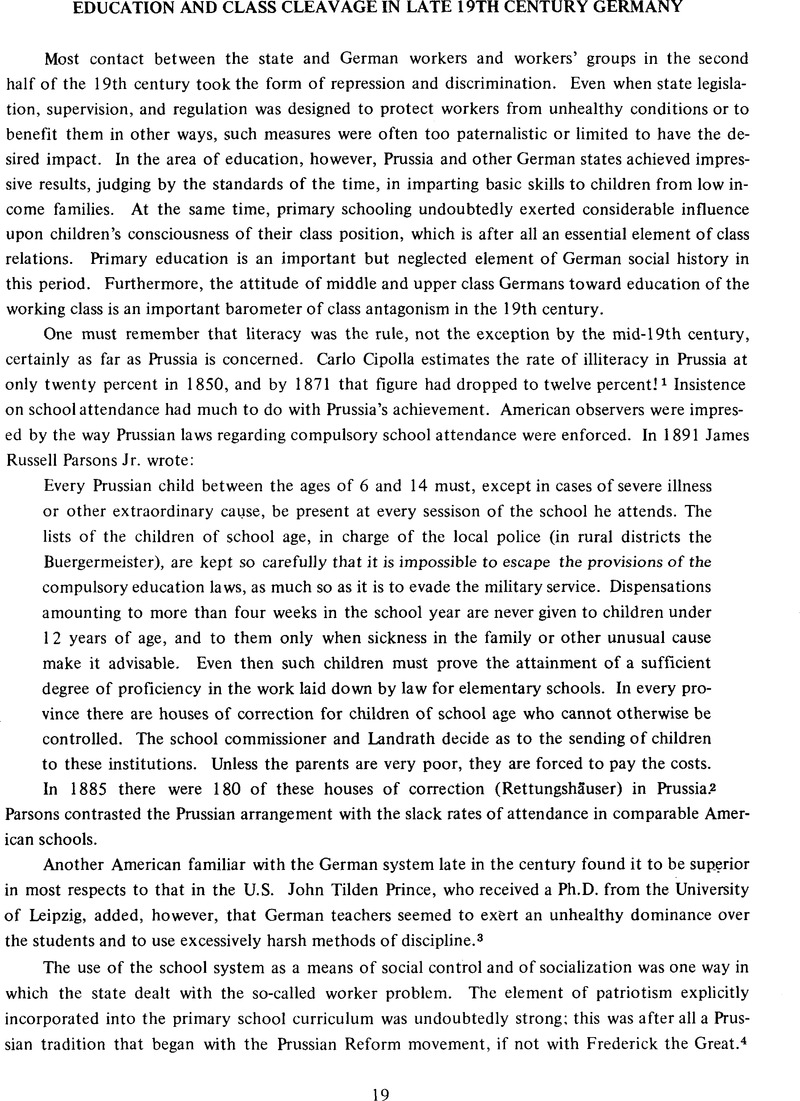No CrossRef data available.
Published online by Cambridge University Press: 16 December 2008

1. Carlo Cipolla, Literacy and Development in the West (London, 1969), 114, 127. The estimate for 1850 refers to adult illiteracy. The twelve percent figure for 1871, taken from national census data, refers to all persons above the age of ten.Google Scholar
2. Parsons, James Russell Jr., “Prussian Schools Through American Eyes,”Fraser, Stewart and Brickman, William, eds., A History of Comparative and International Education: Nineteenth-Century Documents (Glenview, Illinois, 1968), 148.Google Scholar
3. Prince, John Tilden, “Comparisons of American and German Schools,” (1897) in Fraser and Brickman, 274.Google Scholar
4. See the interesting treatment in Paret, Peter, Clausewitz and the State (N.Y., 1976), especially 179–208.Google Scholar
5. Ringer, Fritz K., The Decline of the German Mandarins: The German Academic Community, 1890-1933 (Cambridge, 1969), 39.Google Scholar
6. Kotowski, Georg, Friedrich Ebert. Eine politische Biographie: Der Aufstieg eines deutschen Arbeiterführers (Wiesbaden, 1963), 34.Google ScholarScheidemann, Phillipp, Memoirs of a Social Democrat, tr. Mitchell, J.E. (London, 1929), 1, 6–7.Google ScholarGrzesinski, Albert, Inside Germany, tr. Lipschitz, Alexander, (N.Y., 1939), 19.Google Scholar
7. The seminal work here is Guenther Roth, The Social Democrats in Imperial Germany: A Study in Working-Class Isolation and National Integration (Totowa, New Jersey, 1963).Google ScholarSee also Groh, Dieter, Negative Integration und revolutionarer Attentismus. Die deutschen Sozialdemokratie am Vorabend des Ersten Weltkrieges (Frankfurt am Main, 1973)Google Scholar, and Saul, Klaus, Staat, Industrie, Arbeiterbewegung im Kaiserreich. Zur Innen-und Assenpolitik des Wilhelminischen Deutschland 1903-1914 (Dusseldorf, 1974).Google Scholar
8. Ringer, 39.
9. Quoted in Ritter, Emil, Die katholisch-soziale Bewegung Deutschlands im 19. Jahrhundert und der Volksverein (Cologne, 1954), 98.Google Scholar
10. Ackerknecht, Erwin, Rudolf Virchow: Doctor, Statesman, Anthropologist (Madison, Wisconsin, 1953), 127.Google Scholar
11. Richter, Adolf, Bismarck und die Arbeiterfrage im preussischen Verfassungskonflikt (Stuttgart, 1933), 253–54.Google Scholar
12. Reprinted in Magdalene Zimmerman, Die Gartenlaube als Dokument Ihrer Zeit (Munich, 1963), 127.Google Scholar
13. Dietzel, H., Karl Rodbertus: Darstellung seines Lebens und seine Lehre (Jena, 1886), 9, 72.Google Scholar
14. Boehmert, Viktor, “Die gerechte Verteilung der Gueter,” Der Arbeiterfreund, vol. XIII (1875), 102.Google Scholar
15. Boehmert, Victor, “Die Wirtschaftslehre als ein Mittel zur Loesung der socialen Frage,” Der Arbeiterfreund, vol. XI (1873), 240.Google Scholar
16. Ludwig Gumplowitz, Der Rassenkampf (Innsburck, 1883), 237.Google Scholar
17. Treitschke, Heinrich von, “Noch ein Wort zur Arbeiterfrage,”Preussische Jahrbücher, vol. XXXIX, no. 6 (1877), 666.Google Scholar
18. Quoted in Oberschall, Anthony, Empirical Social Research in Germany 1848-1914 (Paris, 1965), 70.Google Scholar
19. Goehre, Paul, Three Months in a Workshop, tr. Carr, A.B. (London, 1895), viii.Google Scholar
20. Treitschke, Heinrich von, “Der Socialismus und seine Goenner,” part 2, Preussische Jahrbücher, vol. XXXIV, no. 3 (1877), 253.Google Scholar